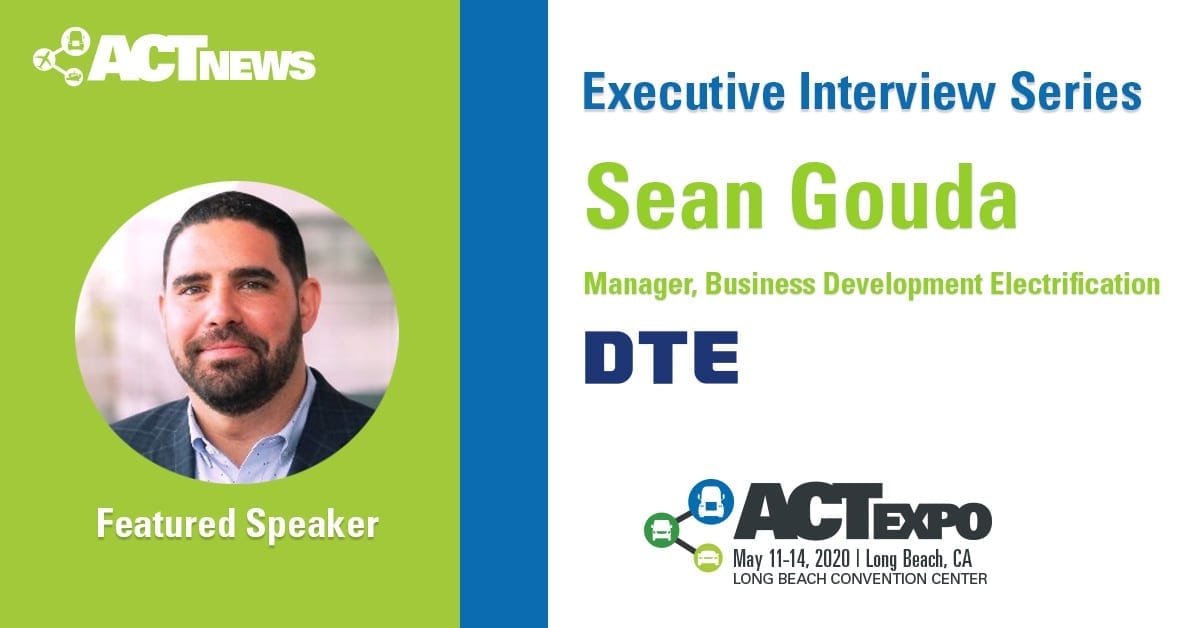An ACT News Executive Interview with Sean Gouda, Manager, Business Development Electrification, to learn about the exciting transportation electrification initiatives DTE is implementing in Michigan.
Sean Gouda is proud to be from Michigan, and even prouder to be the third generation of his family with a successful career at DTE Energy, following in the footsteps of his father and grandfather. Sean leads a team of experts who connect key customers and stakeholders to electric-drive technologies that optimize energy use, decrease operating costs and reduce overall greenhouse gas emissions.
DTE Energy (DTE) is a Detroit-based diversified energy company involved in the development and management of energy-related businesses and services nationwide. As a large investor-owned utility, DTE provides reliable electric and natural gas to more than 3.2 million customers throughout Michigan. On the electric side of the business, DTE generates, transmits and distributes electricity, which they’ve been doing for nearly 150 years. DTE has grown into the largest electric utility company in Michigan and one of the largest in the nation.
Sean will be joining a panel of industry experts discussing the path for replacing school buses with low emission technologies in an upcoming workshop Big Wheels Keep on Turning: The Future of School Bus Replacement at ACT Expo, coming up May 11-14, 2020 at the Long Beach Convention Center in Southern California.
ACT News caught up with Sean to learn about his leadership role in transportation electrification, including a unique pilot project that will deploy electric school buses in conjunction with a vehicle-to-grid study and the development of STEM training programs to teach the students about the new buses.
ACT News: As one of Michigan’s leading corporate citizens, DTE is a force for growth and prosperity in the 450 communities it serves. What are some of the initiatives DTE is leading to promote sustainability in transportation?
Sean Gouda: DTE is always striving to be a force for growth, whether it means in our community, our infrastructure, or our various industries. Specifically, in our electrification sector, we are focusing on five segments to electrify transportation:
Mass Transit Buses: We are deploying eight mass transit buses and partnering with three transit agencies to plan, deploy, and measure electric bus performance.
eFleets Medium/Heavy Duty: We are educating commercial and industrial customers of product availability, practical use cases coupled, and total cost of ownership analysis. We plan to announce a pilot in this area in 2020.
eSchool Buses: We have deployed six eSchool buses with two partner school districts to plan, execute, and measure eSchool bus performance in tandem with a vehicle to grid study.
Airport/Ports: We are at the consulting stages of a sustainability plan with our largest airport authority.
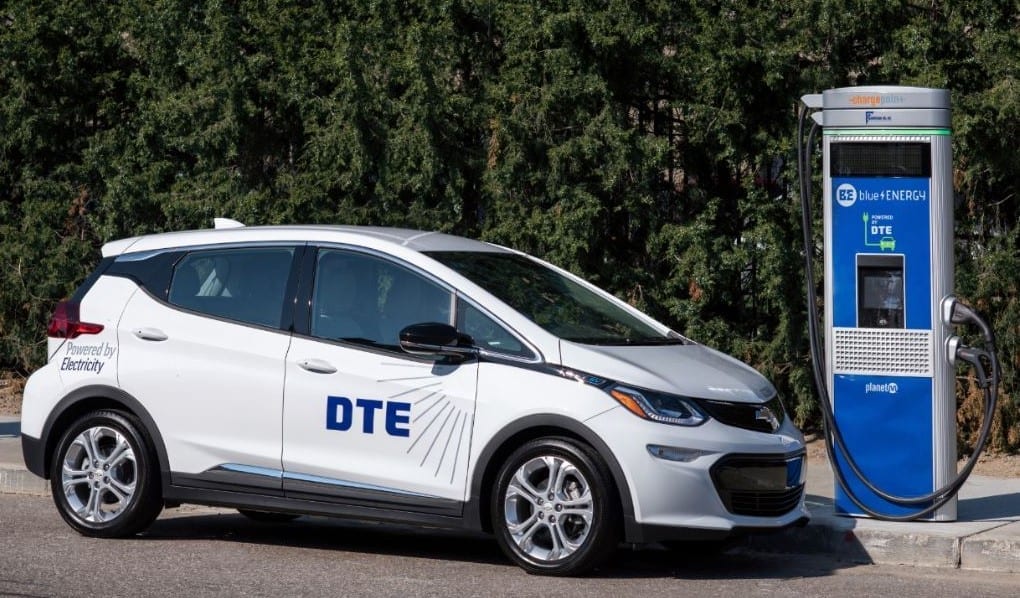
ACT News: Charging Forward is a consumer program from DTE with a rebate offer for the residential installation of Level 2 chargers. How will this program help consumers on their journey to driving electric vehicles?
Sean Gouda: DTE is committed to bringing the benefits of transportation electrification to Michigan residents and businesses with outreach and incentives to support charging infrastructure growth. DTE Energy launched its Charging Forward program driving electric vehicle education, infrastructure and adoption in June 2019, and we are encouraged by the enthusiasm we have seen for EVs across the state. We are particularly excited to see DC fast charging interest from site hosts in southeast Michigan, and we have approved over 40 fast charger rebates to date. Additionally, we have approved rebates for 220 residential and commercial Level 2 charger ports in just 8 months.
ACT News: DTE partnered with two of Michigan’s Public Schools to secure grant funds for electric school buses and charging equipment for a pilot project that will include a vehicle-to-grid study. Please tell us about this unique and exciting project, and the role DTE will play.
Sean Gouda: DTE is the overall project manager for the electric school bus project, coordinating the deliverables of the pilot alongside the OEMs, school districts, and agencies involved. The partners on this project are Thomas Built Buses for the bus shell, Proterra for the battery and charger, Hoekstra Transportation for aftermarket support, Roseville Community Schools and Ann Arbor Public Schools, and the Michigan Association for Pupil Transportation. In our lead role on the project we’ve developed a management plan that addresses schedule, cost, and quality resulting in achieving the pilot’s goals.
We are on schedule to deliver these key milestones:
- Infrastructure construction and utility equipment installation to begin by March 31, 2020.
- Charging station installation and testing between June 1, 2020and August 1, 2020.
- Deploy two Roseville Community Schools buses and four Ann Arbor Public Schools buses on or before August 1, 2020.
- Retire from operating two diesel-fueled Roseville Community Schools buses and four Ann Arbor Public Schools buses on or before December 2020.
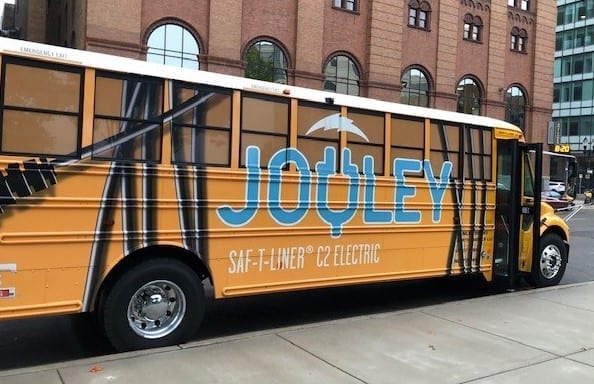
To expose the students to the STEM technologies in this pilot, we’ve also created a curriculum to coincide with it. DTE has joined with the Michigan Association of Pupil Transportation to develop educational programs around the new buses. Students will see real-world applications of new innovations, such as the zero-emission electric technologies the buses employ, as part of their focus in STEM.
In November 2019, we hosted a brainstorming session at DTE’s headquarters with Ann Arbor and Roseville school districts to develop ideas and activities that will prepare STEM training programs for students. This curriculum will serve as a great educational opportunity for students K through 12 and instill in them the knowledge of what it takes to reduce our carbon footprint. We’ve established a working group with about a dozen educators and are currently meeting monthly working towards a launch date of September 2020.
ACT News: You are speaking at ACT Expo, May 12, on the panel “Big Wheels keep on Turning: The Future of School Bus Replacement,” which will explore the challenges that early market entrants have experienced in their path to replacing school bus fleets with low emission technologies. What are some of the challenges DTE has faced, and how does DTE plan to keep advancing these technologies in the communities you serve?
Sean Gouda: While there are many opportunities in this space, DTE has identified four barriers adopting this technology for school districts. First, the absence of ZEV policy. We’re taking a comprehensive look at how DTE can collaboratively craft and support transportation electrification policy across Michigan. Second, the premium price of an all-electric school bus compared to a diesel bus is ~$250,000 today. Our team is evaluating business models that can help schools overcome the financial burden. Third, energy grid readiness will be our core competence ensuring the commercialized deployment of electric school buses within our service
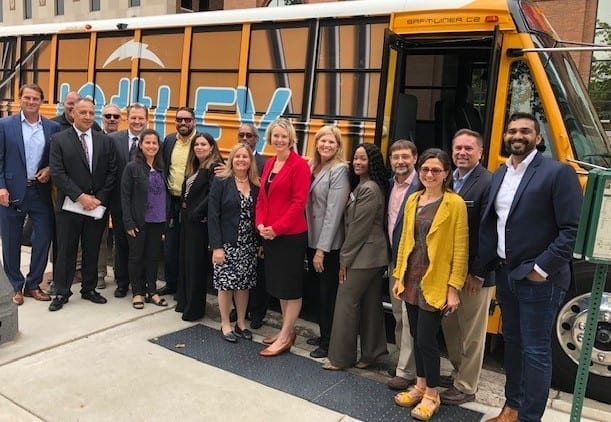 territory. We are aligning our five-year energy grid investment strategy with our forecasted EV impact study, driving affordability in capital deployed and consumer electric rates. Finally, it is challenging for school bus operators to stay tuned into rapidly changing technology. They need guidance in determining the best solutions for their unique use cases. We strive to educate our school district customers on total cost of ownership, emission reductions, and health benefits, all while providing students with a mobile laboratory to learn about sustainable technologies.
territory. We are aligning our five-year energy grid investment strategy with our forecasted EV impact study, driving affordability in capital deployed and consumer electric rates. Finally, it is challenging for school bus operators to stay tuned into rapidly changing technology. They need guidance in determining the best solutions for their unique use cases. We strive to educate our school district customers on total cost of ownership, emission reductions, and health benefits, all while providing students with a mobile laboratory to learn about sustainable technologies.
ACT News: What drew you to DTE originally? And how has DTE changed since?
Sean Gouda: My grandfather and father worked for DTE for over 60 years and the enterprise provides for three generations of our family now. I wanted to work for an NFL front office but when I graduated from the University of Michigan none of the 32 teams were waiting for me. My father had an opportunity for me to interview at DTE and 14 years later, here we are establishing a new business called Electrification. The company has changed so much with our workforce turnover and new CEO Jerry Norcia. We are embarking upon a cultural transformation and we’re putting our people first, purpose over process! I am truly blessed with the responsibility of leading a new team within the enterprise, and I’m excited for the next decade to problem solve disruptive technologies and harness innovation within our industry.
ACT News: What advice would you offer to young professionals interested in pursuing a similar career path?
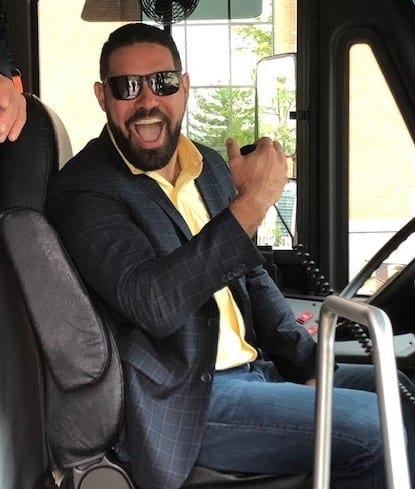
Sean Gouda: Become a learner if you are not already. I often ask my mentors and mentees what books they’re currently reading- this provides great conversations on personal and professional development with perspectives on issues that you cannot solve on your own. Find ways to contribute value without needing direction all the time. Spend time networking (getting to know people’s families, interests and desires), and when you ask someone how they’re doing, stop and listen. It’s amazing what you will find out. Lastly, be patient. Napoleon Hill stated, “Every adversity brings with it the seed of an equivalent advantage (Think and Grow Rich, 2005, Pg. 35).
Here is what I am reading:
- The Innovator’s Dilemma, Clayton Christensen, 1997
- Think and Grow Rich, Napoleon Hill, 2005
- Leaders Eat Last, Simon Sinek, 2014
ACT News: What has been the most important innovation you have witnessed in your lifetime?
Sean Gouda: The internet or “World Wide Web” is the most important innovation of my lifetime. The internet didn’t become available until I was in high school and we had dial over phone speeds (56kbs), which was very slow. It was amazing to me pulling up a Google page for the first time and asking it anything and getting answers. Before the internet, it was the library or conducting an interview. The speed and breadth of information that is now available at people’s fingertips has changed the world.
ACT News: What does true leadership mean to you?
Sean Gouda: Simon Sinek states, “We can actually feel the weight of responsibility when others commit time and energy to support us. We want them to feel that the sacrifices they made for us were worth it. We don’t want to let them down. We want to make them proud. And if we are the ones giving support, we feel an equal sense of responsibility. We want to do right by them so that they can accomplish all that they set out to do.” (Leaders Eat Last, 2014 Pg. 58). For ten years of my 14-year career I had the honor to be led by an extraordinary woman, Yvette Johnson, who embodied this quote, “Don’t chase money, follow great leaders!”

